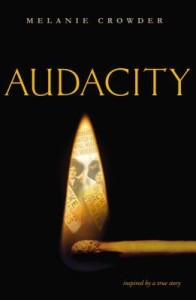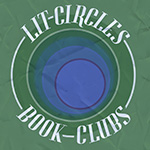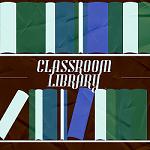Audacity
Author: Melanie Crowder
Published: January 8, 2015 by Philomel
Goodreads Summary: The inspiring story of Clara Lemlich, whose fight for equal rights led to the largest strike by women in American history
A gorgeously told novel in verse written with intimacy and power, Audacity is inspired by the real-life story of Clara Lemlich, a spirited young woman who emigrated from Russia to New York at the turn of the twentieth century and fought tenaciously for equal rights. Bucking the norms of both her traditional Jewish family and societal conventions, Clara refuses to accept substandard working conditions in the factories on Manhattan’s Lower East Side. For years, Clara devotes herself to the labor fight, speaking up for those who suffer in silence. In time, Clara convinces the women in the factories to strike, organize, and unionize, culminating in the famous Uprising of the 20,000.
Powerful, breathtaking, and inspiring, Audacity is the story of a remarkable young woman, whose passion and selfless devotion to her cause changed the world.
Ricki’s Review: This is an inspirational book in verse based on the true story of Clara Lemlich. She was a Russian Jewish immigrant who was forced to work in horrible factory conditions in the early 1900s. Clara stood up for her rights and fought with the union. What I liked most about this book is the author gives so much information about Orthodox Judaism, unions, and feminism, but she doesn’t hit readers over the head with the information. I don’t enjoy reading books about religion, and I don’t particularly seek out books about feminism (or unions, for that matter), yet I found Clara’s story to be both fascinating and compelling. All types of readers will love this story, and it is very teachable.
Teacher’s Tools for Navigation: I would love to teach this book. It offers great opportunities for building background knowledge about history. I wish this book existed when I used to teach The Jungle because the connections are innumerable. If I taught this book, I would use a jigsaw, research, and/or webquest activity where students spent time researching the 1900s, Russian immigration in the 1900s, unions, feminism, schooling in the 1900s, the Triangle Shirtwaist Factory fire, and Orthodox Judaism. This knowledge would provide a rich reading of this text.
Discussion Questions: How do Clara’s parents and siblings view her actions?; Make a list of your top five values. Then, make a list of Clara’s top five values. Are they the same? Different? Do you think your values differ from hers because of your personalities or because of the different time periods you live in?
We Flagged: “How can I tell Mama / who toils / sunup / to sundown / to be a good mother / a good wife / that this life / (her life) / is not enough for me, / that I dream instead / of words / ideas / a life that stretches far beyond / the bounds of this shtetl?” (p. 12).
*Please note that this quotation is from an advanced reader copy, and the quote may be different in the published version of the book.*
Read This If You Loved: The Jungle by Upton Sinclair, Like Water on Stone by Dana Walrath, A Northern Light by Jennifer Donnelly, Between Shades of Gray by Ruta Sepetys
Recommended For:
**A special thank you to Penguin for sending this book for review!**



